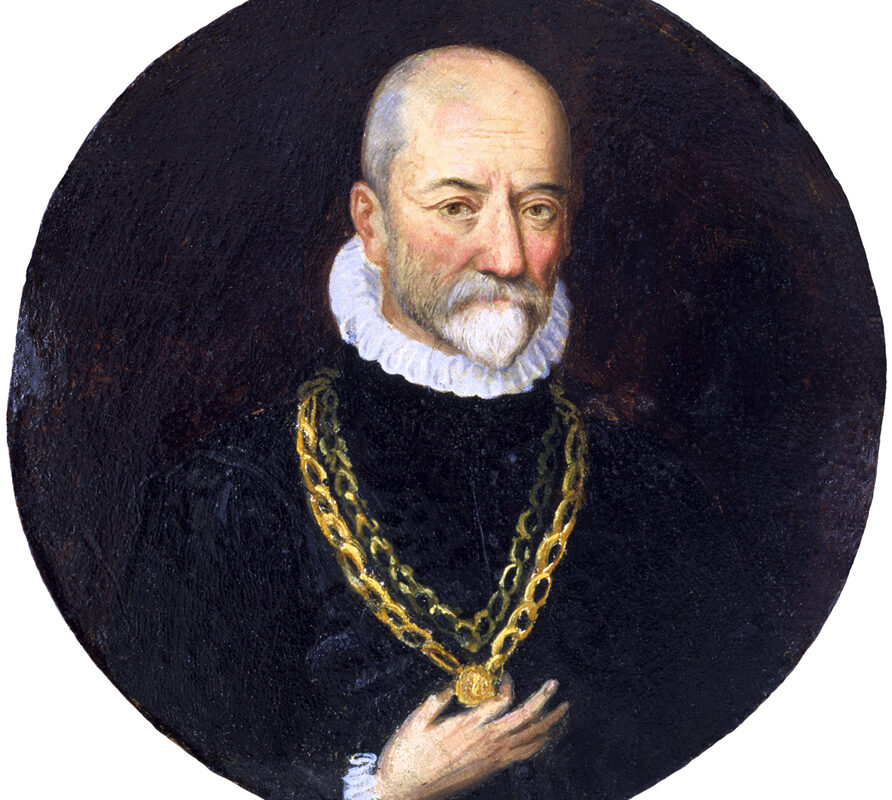Michel de Montaigne was born at home in the Aquitaine region of France on this day, 28 February 1533, to a wealthy and influential family. Montaigne worked as a lawyer, but is celebrated for being the most influential writer of the French Renaissance. Indeed, he is one of the most influential writers in history. Most significantly, Montaigne invented the form of the essay, an “attempt” to order one’s thinking on a topic, as well as to put one’s thoughts into words. It is for this inventive form that his birthday serves as the inspiration for National Essay Day in the United States.
Montaigne’s Education and Life Sketch
Montaigne describes his childhood as being filled with intellectual stimulation, wonder, and music. His father oversaw his education, determined to educate his son as both a gentleman and a scholar, meaning he needed to know multiple languages, as well as feel a comradeship with his countrymen. For Michel’s first three years of life, his father sent him to live with a peasant family, to develop a love for the people Montaigne would go on to serve. His father wanted Montaigne to speak Latin, then the international language of the educated, as a first language, so he hired a German tutor who did not speak French, to speak with Michel only in Latin. Likewise, the household servants were instructed to only speak in Latin to Michel, and his mother and family would also speak with him in Latin. As a result, Michel didn’t learn French until he was six. Michel would also learn Greek from his father by playing games.
Around 1539 at age six, he attended an elite boarding school, the College of Guyenne, located in Bordeaux, which specialized in teaching the liberal arts. He later attended law school, either in Bordeaux or Toulouse. We don’t have details for his attendance, but we do know he later entered the legal system near his family home. In 1557, he was appointed counselor for the Parlement of Bordeaux, and later, from 1561-1564, was a courtier for King Charles IX. Despite resigning in 1570, Montaigne remained active in public life until 1576.
In 1578, he began to suffer from kidney stones, the ailment which had killed his father. He published his first collection of Essays in 1580 to a warm reception. In 1581, he began traveling around Europe, including Germany, Italy, France, etc., in part to find a cure for this ailment. He also traveled to Paris to present a copy of his Essays to the king, and kept a journal documenting his travels. While traveling, he learned he, like his father, had been elected mayor. He would be re-elected in 1583 and 1585, serving for a total of four years. He published the third book of Essays in 1588, and died at home in his library on 13 Sept 1592, at the age of 59.
The French Wars of Religion
Living in the second half of the 16th century, Montaigne’s thinking and leadership was impacted by the Protestant Reformation. Protestant uprisings around Europe represented a major threat to the legitimacy of the Catholic Church, and by extension, the monarchy. French Protestants, much like their German counterparts, were suspicious, and at times hostile, towards Catholic rule. Montaigne’s family, though raised Catholic, was tolerant of Protestant believers. (Three of Montaigne’s siblings eventually converted.) This tolerance allowed Montaigne to work to find solutions agreeable to both sides, rather than strictly imposing the Catholic perspective, and won him much respect among his constituents. Both the Catholic king Henry III and the Protestant king Henry of Navarre greatly respected him for his moderation, as well.
Montaigne continued working to bring peace and find compromise in France even as the Wars of Religion (1562-1598) broke out, during which an estimated 2-4 million people died as a result of the conflict between Catholic believers and Protestant Huguenots. In 1562, he was present with King Charles IX at the siege of Rouen. The city was a key port and administrative center containing a large minority of 15,000 Calvinists, and was rocked by heresy trials from the 1530s through the 1550s. Escalating the religious tension, Catholics and Protestants in Rouen broke into open violence, launching prison breaks, pillaging churches and homes, and culminating in an estimated one thousand deaths. The siege in Rouen would set the stage for the first major battle in the French Wars for Religion in December of the same year. Bringing the city back under the crown’s Catholic control was instrumental to containing the Huguenot rebellion.
Montaigne on Education, Philosophy, and Religion
During the Renaissance, the writings of ancient Greece and Rome were being rediscovered, inspiring the paintings of Leonardo da Vinci and architecture of Catherine de Medici’s Tuileries palace, and prompting many thinkers of Montaigne’s day to accept part and parcel what was written in antiquity simply because it was old and newly rediscovered. It is marked by the rise of humanism, the age of exploration, and a rediscovery – indeed a rebirth, as Renaissance means in French – and celebration of Greek and Roman wisdom. The French Renaissance, more specifically, took place in France roughly between 1494 and 1610.
As a result of this rebirth, Montaigne’s education focused deeply on Classical literature, and by extension, what it means to be human. He was especially fond of Lucretius and Plutarch. (He includes more than 500 quotes from Plutarch in the Essays!) He saw his own time as being filled with corruption, decline, hypocrisy, and violence. Where writers before (and after) him championed the ideals of what humanity might be or should aspire to, Montaigne is concerned with how real individuals conduct themselves, and how convention or custom influence them.
A famous essay, “On Cannibals,” takes ethnocentrism (the idea that one’s own standards are more “civilized” and therefore justified, than elsewhere in the world) to task. Montaigne argues that natural law and simple justice tend to be effective in places and settings considered backward. He contrasts the “barbarity” of these societies, where a man’s duty is summarized as “resoluteness in war and affection for their wives,” while the “civilized” men of then-modern day France were killing one another over religious differences. “Who is really the barbarian here?”, Montaigne asks. It’s a question well worth considering today. What do I accept as “civil” or “good,” simply because it is familiar or part of the culture I live in? For the same reasons, Montaigne did not wholly dismiss the wisdom of the Greeks or Romans out of a misplaced security of being “modern” and therefore, more knowledgeable. Instead of assuming the wisdom of ancient Greece was right or wrong, he subjected these ideas – to scrutiny, accepting only the most resilient of truths.
The longest chapter of the Essays by far, “An Apology for Raymond Sebond” is considered by many scholars the epitome of Montaigne’s thought. It employs a deep skepticism and is summed up, famously, in Montaigne’s trademark, “What do I know?”. Despite its name, very little of the chapter deals with the Catalan thinker Sebond; instead, Montaigne wages a counterattack on Sebond’s critics by demonstrating the futility of unaided human wisdom. “The plague of man is the opinion of knowledge,” he writes, citing examples from the Old Testament, the Stoics, as well as Lucretius and Plutarch, showing how an inflated sense of one’s knowledge has brought countless people to ruin. Employing a lovely metaphor, Montaigne reminds us how the highly educated often resemble ears of wheat; “[T]hey rise high and lofty, … as long as they are empty; but when they are full and swollen with grain …, they begin to grow humble and lower their horns.” It is the truly knowledgeable person willing to recognize how little they actually know.
Montaigne famously championed a position of skepticism. Fittingly, he makes few judgments or prescriptive declarations in his writing, often posing questions instead. Rather than towing a line of thought from any of his admired writers, Montaigne’s writing is the result of contemplating the wisdom of the classics and only retaining what he finds reasonable. Defying categorization, he agrees at times with Plato, at others the Stoics, and at still others with Christianity. Both his writing and his method solidify his stance of examining the wisdom one encounters in texts, wrestling with it, and only accepting that which seems true to your judgment. Critically, Montaigne also reminds us, human judgment is limited and prone to error, so we must always maintain a humility with respect to how much weight we give our own, or anyone’s judgment. Seek knowledge, but hold it loosely; aiming not to be ‘right’, but less wrong. Thinking well and being open to reconsidering what we’ve learned is the only hope we have to arrive at a reasonable understanding of the complex world around us.
While his education under his father was filled with intellectual stimulation and wonder, Montaigne was deeply unhappy with his formal education. For Montaigne, as with the Greeks and Romans, philosophy and education were moral endeavors. Montaigne asserts the purpose of education is to make us better and wiser, and finds the education practices of his day lacking. In “On the Education of Children,” Montaigne rejected the rote memorization practices so common in education. He thought education without joy was pointless; that proper instruction would encourage questioning the ideals held sacred by previous generations; and that no one should be forced to accept any ideal unquestioningly. Quoting Virgil, he echoes the aims of education are to instruct the student in “What hardships to avoid, what to endure, and how,” Put simply, education is meant to make students moral, smarter, more adept, more skillful, and yes, wiser for life. These are lofty goals, concerned not just with practical skills, but the character of the student, as well.
While his education under his father was filled with intellectual stimulation and wonder, Montaigne was deeply unhappy with his formal education. For Montaigne, as with the Greeks and Romans, philosophy and education were moral endeavors. Montaigne asserts the purpose of education is to make us better and wiser, and finds the education practices of his day lacking. In “On the Education of Children,” Montaigne rejected the rote memorization practices so common in education. He thought education without joy was pointless; that proper instruction would encourage questioning the ideals held sacred by previous generations; and that no one should be forced to accept any ideal unquestioningly. Quoting Virgil, he echoes the aims of education are to instruct the student in “What hardships to avoid, what to endure, and how.” Put simply, education is meant to make students moral, smarter, more adept, more skillful, and yes, wiser for life. These are lofty goals, concerned not just with practical skills, but the character of the student, as well.
Why did He Write the Essays?
Exactly what inspired Montaigne to write his essays remains unknown. We know his dear friend, the writer Etienne La Boétie died in 1563, devastating Montaigne. A few years later, in 1568, his father died, upon which he inherited the Chateau de Montaigne. In 1571, he retired, to spend most of his time studying and writing in the tower housing his library, which he called his “citadel”. (This tower is the only original part of the house remaining today.) His library contained over 1500 volumes, making it one of the largest private libraries of his day. In it, he created an environment which would continually inspire him; covering the walls with paintings depicting Biblical narratives and Greek myths. Across the beams and ceiling, he inscribed quotes from great thinkers and poets to inspire him in his work. His famous refrain, “Que sais-je?” (“What do I know?”), was inscribed overhead above his desk. One can imagine him reading a persuasive argument and pausing to consider its merits; leaning back in his chair, and wondering, “What do I really know? What do I have evidence for?” He literally sat in the midst of great minds, sparring with ideas, and recording the results into his master work, the Essays. Surrounded by such a cloud, and in otherwise near-constant isolation, he began writing his Essays, the first series of which were first published in 1580.
Montaigne’s Influence on Other Writers
Montaigne’s general influence is so great, virtually every high school student has been impacted by him. Famously, Montaigne invented the form of the essay – essai in French, meaning “attempt.” Any student of English composition taught to build, structure, and write an essay has been instructed in the spirit of Montaigne’s influence on literature.
More directly, mathematician and philosopher Francis Bacon named his collection of Essays in 1696, honoring Montaigne’s work, marking the first time the form and term were used in English. Montaigne’s skepticism would later influence Rene Descartes in his Meditations, where the philosopher expands his system to address the question of the reality of the outside world. Ralph Waldo Emerson, himself a celebrated essayist, was so struck by Montaigne’s writing, he admits to holding an “outsized admiration” he for the writer, in his essay on Montaigne, called “The Skeptic”. He especially admired Montaigne’s honesty and directness. As recently as the past century, William Hazlitt, E.B. White, and Susan Sontag are just a few of the renowned essayists who have credited Montaigne as an inspiration in their writing.
Conclusion
As you can see, Michel de Montaigne’s writing has influenced untold numbers of students around the world. His example of tolerance is worth aiming to emulate, and his thinking continues to remind us to remain intellectually humble in our quest for wisdom.
Image: Portrait of Michel de Montaigne, anonymous. Circa 1590, French. Source.




